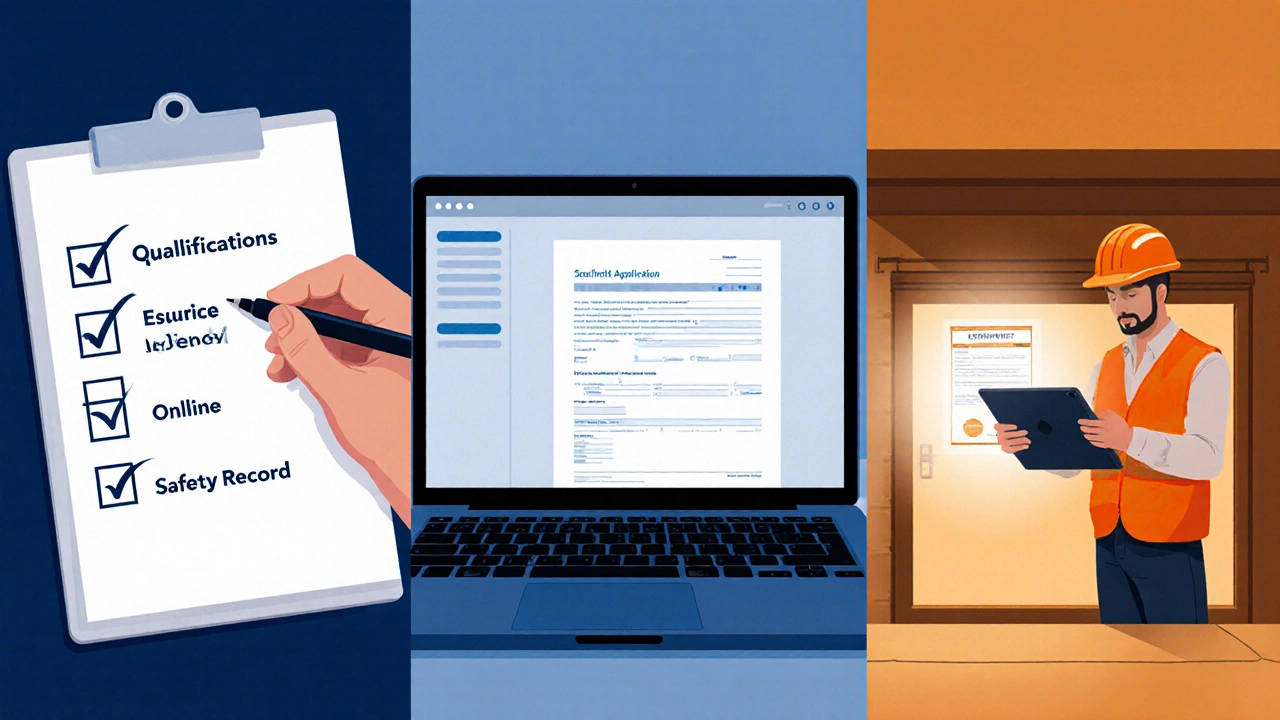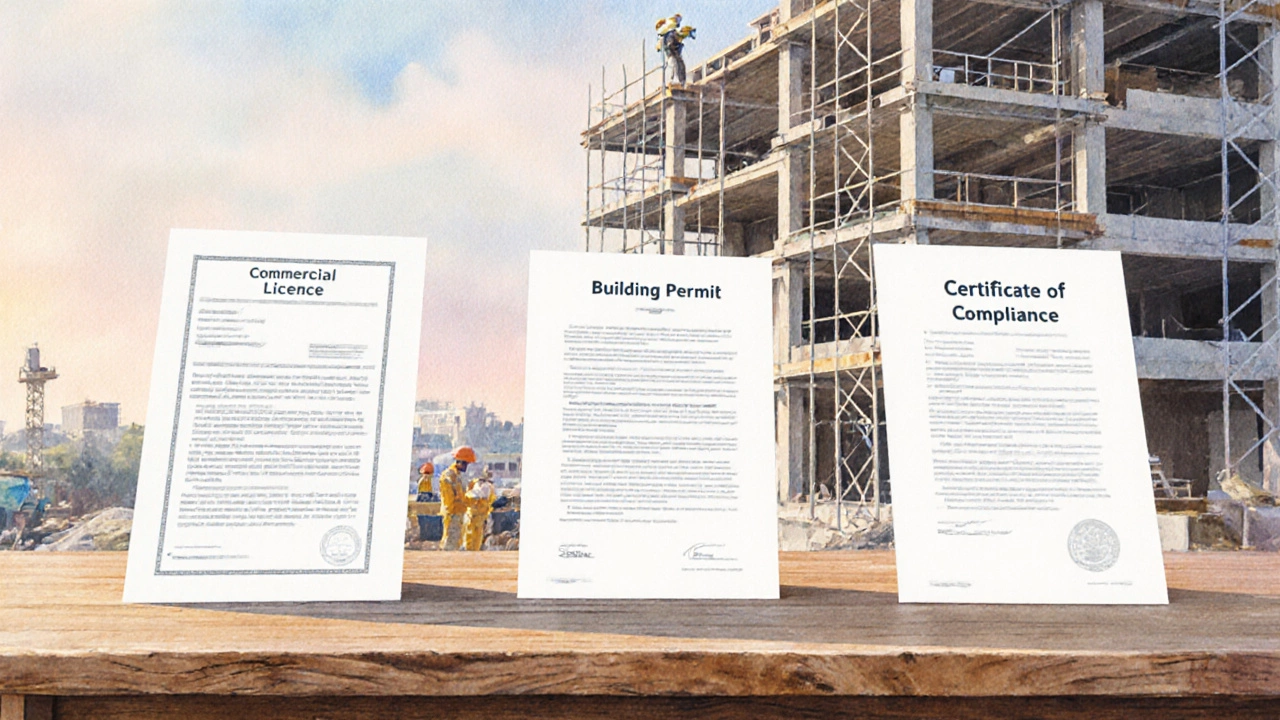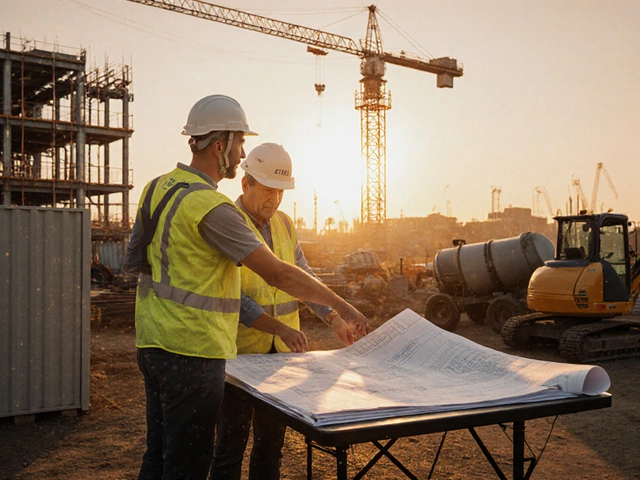
Commercial License Fee Calculator
License Fee Calculator
Estimate your commercial construction license fees based on the type of work you need to perform.
Ever stared at a contract and wondered why a commercial license is suddenly mentioned, even though you already have a building permit? You’re not alone. In commercial construction, a license isn’t just a piece of paper-it’s the legal backbone that lets you start, continue, or finish a project without risking costly shutdowns.
What is a Commercial License?
Commercial license is a government‑issued authorization that permits a business or individual to engage in specific commercial construction activities. It is typically granted by a regional regulatory authority after verifying qualifications, insurance, and compliance with the New Zealand Building Code. In practice, the licence confirms that the holder meets industry standards and can be held legally responsible for the work performed.
How It Differs From a Building Permit
Many people conflate a commercial license with a building permit, but they serve distinct purposes. A Building permit is a document that allows the physical construction or alteration of a structure once the design complies with zoning and safety rules. The permit is project‑specific and expires when the work is completed. In contrast, a commercial license is entity‑specific-it stays with the contractor or firm regardless of how many projects they tackle.
Key Elements of a Commercial License
- Issuing body: Usually the local council or a national agency such as WorkSafe New Zealand the national regulator for health and safety in construction.
- Scope of work: Defines which trades (e.g., structural, electrical, plumbing) the holder can perform.
- Validity period: Most licences run for 12‑24 months and must be renewed with updated proof of insurance and competency.
- Fees: A License fee is a government charge that varies by region and licence class, typically ranging from NZ$250 to NZ$1,200.
- Compliance requirements: Ongoing obligations include maintaining a Certificate of compliance a document proving that all work meets the relevant building standards and submitting annual safety reports.

Types of Commercial Licences in New Zealand
Depending on the scale of your project, you may need one or more of the following licences:
- General building licence covers a broad range of construction activities for commercial buildings.
- Special trade licence required for high‑risk trades like demolition, asbestos removal, or large‑scale steel erection.
- Licensed builder registration an accreditation for firms that consistently meet the Construction Act 2002 standards.
Steps to Obtain a Commercial License
Getting the licence can feel like a marathon, but breaking it down helps:
- Verify eligibility - ensure you have the required qualifications, insurance, and a clean safety record.
- Gather documentation - proof of qualifications, public liability insurance, and a detailed business plan.
- Submit an application - fill out the online form on your local council’s website, attaching all supporting files.
- Pay the licence fee - fees differ by licence type and jurisdiction; keep the receipt for future audits.
- Undergo an inspection - an officer from the regulatory authority may visit your premises to confirm compliance.
- Receive the licence - once approved, you’ll get a digital certificate with a licence number and expiration date.
Renewal, Audits, and Common Pitfalls
Licences aren’t set‑and‑forget. Here’s what to watch out for:
- Late renewal: Operating without a current licence can lead to fines up to NZ$10,000 per day.
- Scope creep: Adding new trades without updating the licence may breach the Construction Act 2002 the primary legislation governing building work in New Zealand.
- Insurance lapses: If your public liability policy lapses, the licence may be suspended during the next audit.
- Missing certificates: Failure to provide a current Certificate of compliance when requested can halt the project.

Commercial License vs. Building Permit vs. Certificate of Compliance
| Document | Purpose | Validity | Issued By |
|---|---|---|---|
| Commercial license | Authorizes a business to perform specific commercial construction activities | 12‑24 months (renewable) | Local council / WorkSafe |
| Building permit | Allows construction or alteration of a particular building | Project‑specific; expires when work is completed | Local council planning department |
| Certificate of compliance | Confirms completed work meets all relevant codes | Valid for the life of the building (or until alterations) | Registered certifier or building inspector |
Quick Checklist Before Starting a Commercial Project
- Confirm you hold a current commercial license for the intended trade.
- Secure a valid building permit for the specific project.
- Verify insurance coverage matches licence requirements.
- Prepare a Construction contract a legally binding agreement outlining scope, timeline, and payment terms.
- Schedule a pre‑start safety audit with WorkSafe.
Frequently Asked Questions
Do I need a commercial license for small renovation work?
If the work involves structural changes, even a modest renovation usually requires a commercial licence. Purely cosmetic updates (painting, carpeting) typically do not, but you still need a building permit for any alterations to walls or services.
Can a foreign contractor operate in NZ without a local commercial license?
Foreign firms must appoint a local licence holder or register as a subsidiary. The licence is tied to a New Zealand‑registered business; simply holding overseas qualifications isn’t enough.
What happens if I work without a licence?
Operating illegally can lead to hefty fines, a stop‑work order, and potential civil liability for any defects. In severe cases, criminal charges may be filed under the Construction Act.
How often must I renew my commercial licence?
Most licences require renewal every 12 to 24 months. Renewal applications must include updated insurance certificates and evidence of any required continuing education.
Is a commercial licence transferable between projects?
Yes, the licence follows the holder, not the project. However, you must still obtain a building permit for each new site and may need to amend the licence if the project scope changes dramatically.




